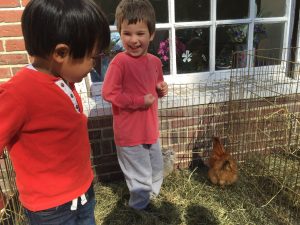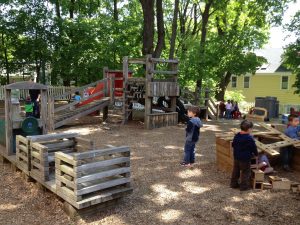 “A child reminds us that playtime is an essential part of our daily routine.” — Anonymous
“A child reminds us that playtime is an essential part of our daily routine.” — Anonymous
All instructional activities, both teacher-guided and unstructured, are geared to the development of all aspects of a child’s growth: intellectual, physical, social, and emotional. At PNS the program allows freedom within the limits appropriate to early childhood and seeks to foster positive attitudes towards school. The program of activities, while informal in nature, is carefully planned to give each child an opportunity to explore his or her abilities and to develop self-confidence through constructive play.
“Freedom within limits, direction without pressure”
Our commitment to the use of developmentally appropriate practices means adapting our instruction and activities to meet the growing and changing needs of our students either individually or as a group.
 Play is an essential activity of early childhood. Through play, children develop physically in both large muscle and small muscle coordination and ability. In addition, play helps a child develop intellectually through practice in conversation, problem-solving, and creative use of imagination; socially through interaction with other children which strengthens skills in sharing, following rules, cooperating in a group, and role-playing; and emotionally through providing opportunities to explore fears in a safe setting and express feelings in ways that are socially acceptable.
Play is an essential activity of early childhood. Through play, children develop physically in both large muscle and small muscle coordination and ability. In addition, play helps a child develop intellectually through practice in conversation, problem-solving, and creative use of imagination; socially through interaction with other children which strengthens skills in sharing, following rules, cooperating in a group, and role-playing; and emotionally through providing opportunities to explore fears in a safe setting and express feelings in ways that are socially acceptable.
Play takes many forms in the preschool schedule. Some play may be free or unstructured when the child chooses his or her own activity. Other times, play is more structured and may take the form of group games, art, music or story times, or learning activities that are planned according to an instructional theme such as color or letter recognition.
Plymouth Nursery School shall not discriminate in providing services to children and their families on the basis of race, religion, cultural heritage, political beliefs, marital status, disability, national origins or sexual orientation.
“Children are like kites…
You spend years trying to get them off the ground.
You run with them until you are both breathless.
They crash … they hit the roof …
you patch, comfort and assure them that someday they will fly.
Finally, they are airborne.
They need more string, and you keep letting it out.
They tug, and with each twist of the twine,
there is sadness that goes with joy.
The kite becomes more distant,
and you know it won’t be long
before that beautiful creature will snap
the lifeline that binds you together
and will soar as meant to soar
… free and alone.
Only then do you know that you have done your job.”
~~ Author Unknown ~~
